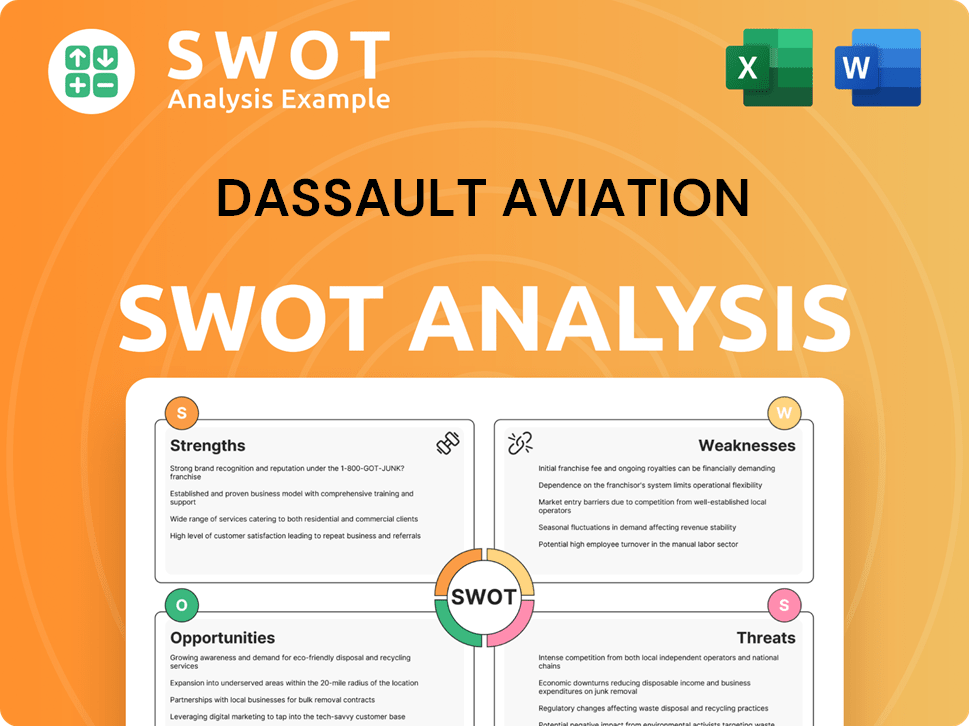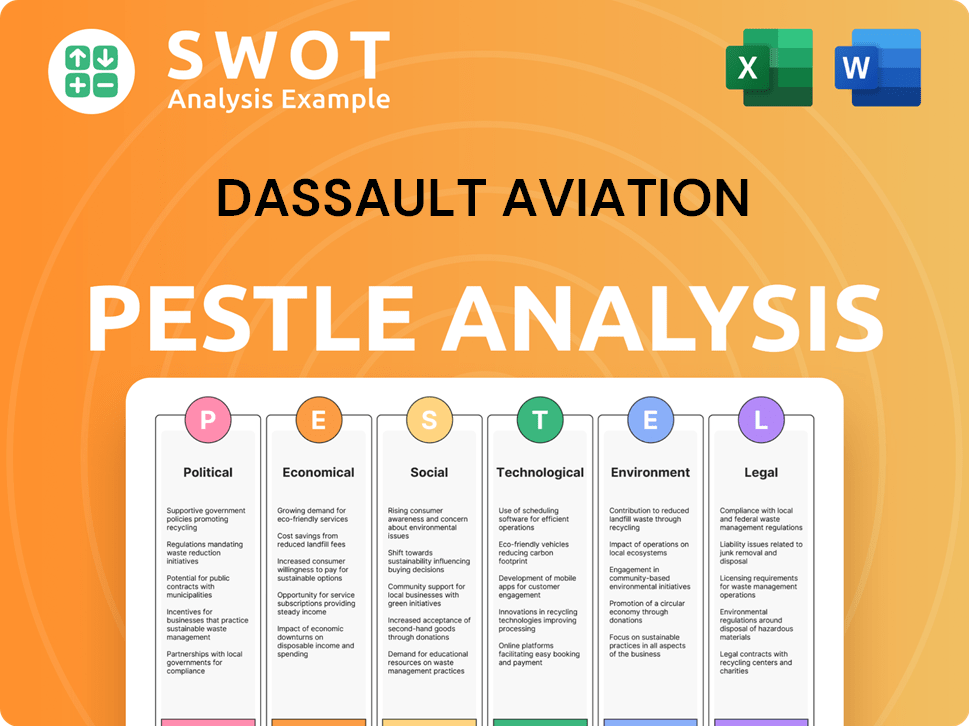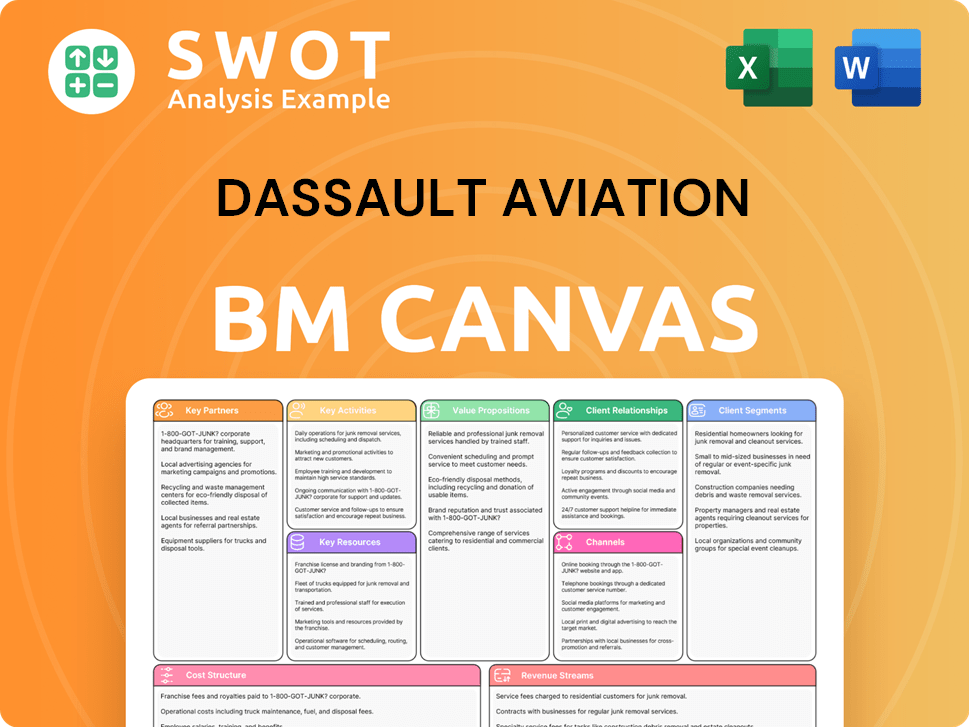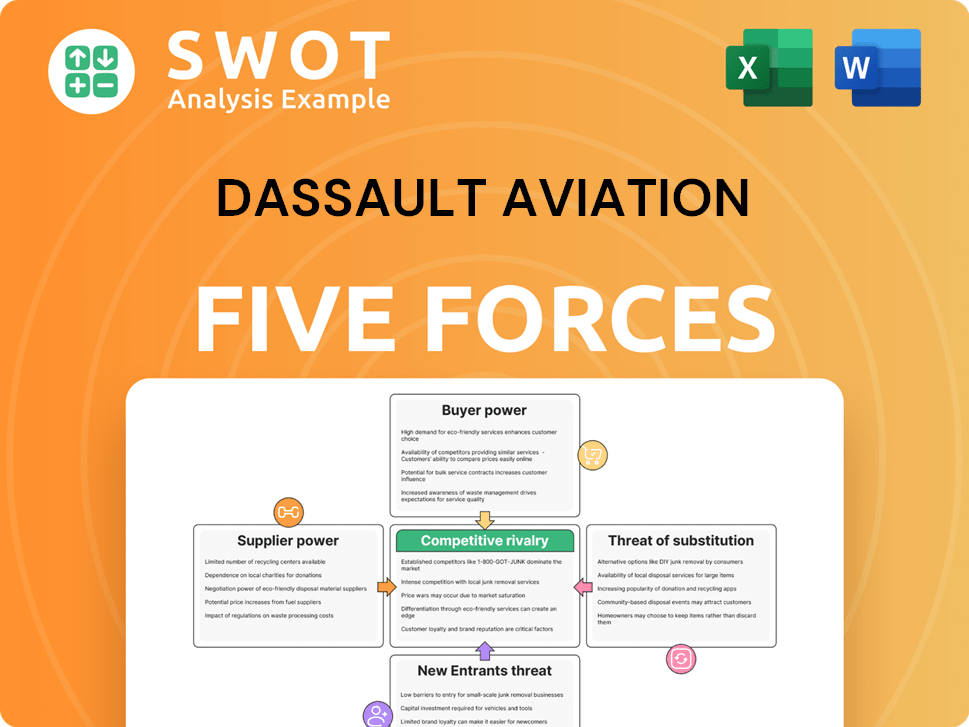Dassault Aviation Bundle
How Does Dassault Aviation Soar?
Dassault Aviation, a leading French aircraft manufacturer, dominates the skies with its impressive lineup of military aircraft and luxurious business jets. From the formidable Rafale fighter jet to the sleek Falcon family, Dassault company caters to a global clientele with its innovative designs and unwavering commitment to quality. Understanding the inner workings of this aerospace giant is key to unlocking its strategic advantages and future potential.

This exploration into Dassault Aviation will uncover the secrets behind its success, examining its core operations, revenue streams, and strategic positioning within the competitive aerospace landscape. Whether you're an investor, a customer, or an industry observer, gaining insights into Dassault's business model is essential. To further understand its strengths and weaknesses, consider a detailed Dassault Aviation SWOT Analysis.
What Are the Key Operations Driving Dassault Aviation’s Success?
Dassault Aviation's core operations revolve around designing, developing, manufacturing, and supporting advanced aerospace solutions. The company is a prominent French aircraft manufacturer, specializing in both military aircraft and business jets. Its offerings cater to a global customer base, including governments and private entities.
The company's primary focus is on two main product lines: the Rafale multirole combat aircraft and the Falcon range of business jets. The Rafale is known for its versatility and operational capabilities, while the Falcon jets are recognized for their performance and technological sophistication. This dual focus allows Dassault to serve diverse markets, from defense to private aviation.
Dassault Aviation's value proposition lies in its ability to deliver high-performance, reliable, and technologically advanced aircraft. This is achieved through a combination of cutting-edge design, precision manufacturing, and comprehensive customer support. The company's commitment to innovation and customer satisfaction is a key differentiator in the aerospace market.
Dassault Aviation's main products include the Rafale fighter jet and the Falcon business jet series. The Rafale is a multirole combat aircraft used by various air forces globally. The Falcon jets are popular in the business aviation sector due to their performance and luxury.
The customer base for Dassault Aviation includes governments, air forces, corporations, and high-net-worth individuals. Military aircraft are primarily sold to governments through direct agreements. Business jets are sold to corporations and individuals through a global sales network.
Dassault Aviation's operational processes involve advanced R&D, precision manufacturing, and rigorous testing. The company uses digital design tools and advanced manufacturing techniques. A global supply chain supports the production of high-quality aircraft components.
Post-sales support is a crucial part of Dassault's value delivery, including maintenance, repair, and overhaul (MRO) services. This ensures operational readiness and customer satisfaction. The company provides comprehensive support throughout the product lifecycle.
Dassault Aviation's success is built on its integrated approach to design, manufacturing, and support. The company focuses on innovation and customer-centricity. It has a strong global presence, with a significant role in the aerospace industry.
- Rafale Fighter Jet: A multirole combat aircraft with advanced capabilities.
- Falcon Business Jets: Known for their performance, comfort, and technological sophistication.
- Global Sales Network: A dedicated network for business jet sales and authorized dealers.
- Post-Sales Support: Comprehensive MRO services to ensure customer satisfaction.
Dassault Aviation SWOT Analysis
- Complete SWOT Breakdown
- Fully Customizable
- Editable in Excel & Word
- Professional Formatting
- Investor-Ready Format

How Does Dassault Aviation Make Money?
The Dassault Aviation, a prominent French aircraft manufacturer, generates revenue through two primary segments: military aircraft and business jets. The company’s financial performance is significantly influenced by sales of its Rafale fighter jets and Falcon business jet models. This dual approach allows Dassault Aviation to cater to both governmental and private sector demands, ensuring diversified revenue streams.
Dassault Aviation's revenue model extends beyond initial aircraft sales. It incorporates comprehensive support services, which provide a recurring revenue stream. These services include maintenance, upgrades, and spare parts, crucial for long-term customer relationships and financial stability. Strategic partnerships also play a role in revenue generation, contributing through joint development programs and shared technology initiatives.
In 2024, Dassault Aviation reported a net sales increase to 7.2 billion euros, up from 5.4 billion euros in 2023. This growth was primarily driven by strong order intake, particularly for Rafale exports. The company's order book stood at 38.0 billion euros at the end of 2024, a significant increase from 21.2 billion euros in 2023, indicating robust future revenue streams. This strong order backlog underscores the company's financial health and market position.
Dassault Aviation utilizes several strategies to monetize its products and services effectively. The military aircraft segment benefits from large government contracts and long-term support agreements. The business jet segment focuses on consistent sales and service revenue, including maintenance programs like FalconCare. These approaches ensure a diversified and stable financial outlook for the Dassault company.
- Military Aircraft: Revenue from Rafale fighter jet sales, associated equipment, and long-term support contracts.
- Business Jets: Revenue from Falcon jet sales, maintenance, spare parts, and customization services.
- Through-Life Support: Recurring revenue from fleet maintenance, pilot training, and system upgrades for military aircraft. FalconCare and other service contracts for business jets.
- Strategic Partnerships: Revenue from joint development programs and shared technology initiatives.
Dassault Aviation PESTLE Analysis
- Covers All 6 PESTLE Categories
- No Research Needed – Save Hours of Work
- Built by Experts, Trusted by Consultants
- Instant Download, Ready to Use
- 100% Editable, Fully Customizable

Which Strategic Decisions Have Shaped Dassault Aviation’s Business Model?
Dassault Aviation has a rich history marked by significant achievements and strategic decisions that have shaped its operational and financial performance. A key milestone is the ongoing success of the Rafale fighter jet, which has secured substantial export orders. This has significantly boosted the company's order book and revenue outlook. Another critical aspect is the continuous evolution of its Falcon business jet family, with new models demonstrating a commitment to innovation and meeting market demands.
The company's strategic moves include adapting to global challenges, such as supply chain disruptions, by strengthening supplier relationships and optimizing internal production processes. Dassault Aviation also focuses on technological leadership in the business aviation sector, with ongoing research and development. This includes investments in sustainable aviation solutions and advanced digital capabilities, ensuring its sustained relevance and competitive position in a dynamic industry.
Dassault Aviation's competitive advantages stem from its strong brand reputation, advanced technological capabilities, and a deep understanding of both military and civilian aerospace requirements. Its vertically integrated approach allows for greater control over quality and innovation. Furthermore, the company's long-standing relationships with key government clients and its ability to customize aircraft provide a significant competitive edge. For more insights into the company's growth strategy, consider reading Growth Strategy of Dassault Aviation.
The Rafale fighter jet's success in securing international orders is a major milestone. The Falcon business jet family's continuous evolution, with models like the Falcon 6X and Falcon 10X, demonstrates innovation. These advancements showcase Dassault Aviation's commitment to meeting evolving market demands.
Strengthening supplier relationships and optimizing production to manage supply chain disruptions. Investing in research and development for sustainable aviation and advanced digital capabilities. These moves ensure Dassault Aviation's long-term competitiveness in the aerospace industry.
A strong brand reputation for engineering excellence and advanced technology. A vertically integrated approach, allowing for greater control over quality and innovation. Long-standing relationships with key government clients and aircraft customization capabilities provide a significant advantage.
In 2024, Dassault Aviation reported strong financial results, with revenues increasing due to higher aircraft deliveries. The company's order book remains robust, driven by demand for both military and business jets. Specific financial figures for 2025 are expected to reflect continued growth, supported by ongoing Rafale exports and the Falcon jet family's performance. The company's focus on innovation and operational efficiency is expected to contribute to sustained profitability.
Dassault Aviation has a significant global presence, with a strong customer base in both military and civilian sectors. The company's employee count is estimated to be around 11,000, reflecting its substantial operational scale. The company continues to invest heavily in research and development to maintain its competitive edge in the aerospace industry.
- Rafale fighter jet exports to countries like India, Qatar, and the UAE.
- Ongoing development of Falcon business jet models such as the Falcon 6X and 10X.
- Strong relationships with key government clients and a vertically integrated approach.
- Continuous investment in research and development for future aerospace technologies.
Dassault Aviation Business Model Canvas
- Complete 9-Block Business Model Canvas
- Effortlessly Communicate Your Business Strategy
- Investor-Ready BMC Format
- 100% Editable and Customizable
- Clear and Structured Layout

How Is Dassault Aviation Positioning Itself for Continued Success?
Dassault Aviation holds a significant position in the global aerospace market, particularly in the niche areas of high-performance military aircraft and premium business jets. As a French aircraft manufacturer, the company competes with major players like Lockheed Martin and Boeing in the military sector, and with Bombardier, Gulfstream, and Textron Aviation in business aviation. Dassault's strong customer loyalty and global sales network further solidify its market position.
The company's robust market position is reflected in its order book, which stood at a substantial €38.0 billion at the end of 2024. This strong backlog indicates sustained demand for its products, including the Rafale fighter jet and the Falcon series of business jets. Understanding the Competitors Landscape of Dassault Aviation is crucial to assess its industry position.
Dassault Aviation faces several key risks, including the cyclical nature of the business jet market and geopolitical instability, which can affect military aircraft sales. Intense competition from larger aerospace conglomerates also poses a challenge. Regulatory changes related to aviation emissions and international trade policies could further impact operations.
The future outlook for Dassault Aviation appears strong, driven by sustained demand for the Rafale, with ongoing export campaigns and potential upgrades for existing fleets. The introduction of new Falcon models, such as the Falcon 6X and the upcoming Falcon 10X, is expected to drive future sales. The company's strategic initiatives support long-term growth.
Dassault Aviation's strategic initiatives include continued investment in R&D for next-generation aircraft technologies, enhancing its digital capabilities across its value chain, and exploring opportunities in sustainable aviation. These efforts aim to maintain its technological leadership and expand its global footprint. The company is focused on adapting to emerging market demands.
- Ongoing export campaigns for the Rafale, including recent orders from Indonesia and the UAE.
- Development and launch of new Falcon business jet models.
- Continued investment in research and development for advanced aircraft technologies.
- Focus on sustainable aviation practices to meet future regulatory requirements.
Dassault Aviation Porter's Five Forces Analysis
- Covers All 5 Competitive Forces in Detail
- Structured for Consultants, Students, and Founders
- 100% Editable in Microsoft Word & Excel
- Instant Digital Download – Use Immediately
- Compatible with Mac & PC – Fully Unlocked

Related Blogs
- What are Mission Vision & Core Values of Dassault Aviation Company?
- What is Competitive Landscape of Dassault Aviation Company?
- What is Growth Strategy and Future Prospects of Dassault Aviation Company?
- What is Sales and Marketing Strategy of Dassault Aviation Company?
- What is Brief History of Dassault Aviation Company?
- Who Owns Dassault Aviation Company?
- What is Customer Demographics and Target Market of Dassault Aviation Company?
Disclaimer
All information, articles, and product details provided on this website are for general informational and educational purposes only. We do not claim any ownership over, nor do we intend to infringe upon, any trademarks, copyrights, logos, brand names, or other intellectual property mentioned or depicted on this site. Such intellectual property remains the property of its respective owners, and any references here are made solely for identification or informational purposes, without implying any affiliation, endorsement, or partnership.
We make no representations or warranties, express or implied, regarding the accuracy, completeness, or suitability of any content or products presented. Nothing on this website should be construed as legal, tax, investment, financial, medical, or other professional advice. In addition, no part of this site—including articles or product references—constitutes a solicitation, recommendation, endorsement, advertisement, or offer to buy or sell any securities, franchises, or other financial instruments, particularly in jurisdictions where such activity would be unlawful.
All content is of a general nature and may not address the specific circumstances of any individual or entity. It is not a substitute for professional advice or services. Any actions you take based on the information provided here are strictly at your own risk. You accept full responsibility for any decisions or outcomes arising from your use of this website and agree to release us from any liability in connection with your use of, or reliance upon, the content or products found herein.